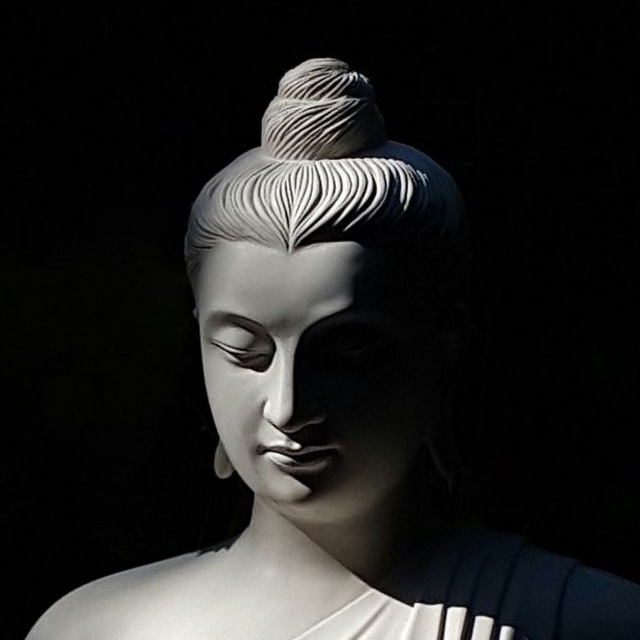V
Size: a a a
2021 April 14
Вообще английский это не китайский и можно уже его и научиться так читать, лол, слова простые и понятные
V
впрочем у меня искаженное восприятие английского
kw
Да и сервисов сейчас полно копи паст и готово
kw
Были бы желание и заинтересованность
V
"В великом совершенстве, сознование играет первоочередную роль в просветлении живых существ, так же как и в их застревании в сансаре, определяющим моментом разделяющим одно от другого является то "распознано" ли сознавение как то, чем оно является. То есть, что существа и их окружение на самом деле составлют одно и то же сознавание, и, что существа могут или распознать это, или они могут ошибочно видеть мир состоящим из внешних объектов, совершенно отделенных от них, как от воспринимающих их субъектов. "Распознавание" таким образом это простое действие которое ведет к просветлению. "Нераспознавание" с другой строны в этих семенных текстах является версии базового неведения, которое для буддистов поражает всех живых существ, вынуждая их делить мир на части, разделяясь на "я", которое нужно оберегать и "другое", которое становится объектами цепляния (привязанности) или отталкивания (ненависти)" - Хатчел Кристофер, "Обнаженное видение. Великое совершеноство, колесо времени и тибетский буддизм видение в эпоху возрождения"
V
перевёл, так проще чем через гугл транслейт, так как он в таких замороченных текстах порет горячку
V
книга, кстати, походу бомбическая
V
Переслано от Vasily
In that case, Bāhiya, you should train yourself thus: In what is seen there must be only what is seen, in what is heard there must be only what is heard, in what is sensed there must be only what is sensed, in what is cognized there must be only what is cognized. This is the way, Bāhiya, you should train yourself.
В таком случае, Бахийя, тебе надо практиковать следующим образом: в видимом должно быть только видимое, в слышимом, только слышимое, в ощущаемом, только ощущаемое, в мышлении, только то, что есть в мышлении. Вот таким образом, Бахия, надо практиковать.
“And since for you, Bāhiya, in what is seen there will be only what is seen, in what is heard there will be only what is heard, in what is sensed there will be only what is sensed, in what is cognized there will be only what is cognized, therefore, Bāhiya, you will not be with that; and since, Bāhiya, you will not be with that, therefore, Bāhiya, you will not be in that; and since, Bāhiya, you will not be in that, therefore, Bāhiya, you will not be here or hereafter or in between the two—just this is the end of suffering.”
И потому, что для тебя, Бахийя, в видимом будет только видимое, в слышимом только слышимое, в ощущаемом только ощущаемое, а в мышлении только то, что есть в мышлении, поэтому, Бахийя, тебя с этим не будет, и поэтому, Бахийя, тебя в этом не будет, а так как тебя в этом не будет, поэтому тебя не будет ни здесь ни потом/(ни там), ни где-то между ними — это и есть конец страданиям.
В таком случае, Бахийя, тебе надо практиковать следующим образом: в видимом должно быть только видимое, в слышимом, только слышимое, в ощущаемом, только ощущаемое, в мышлении, только то, что есть в мышлении. Вот таким образом, Бахия, надо практиковать.
“And since for you, Bāhiya, in what is seen there will be only what is seen, in what is heard there will be only what is heard, in what is sensed there will be only what is sensed, in what is cognized there will be only what is cognized, therefore, Bāhiya, you will not be with that; and since, Bāhiya, you will not be with that, therefore, Bāhiya, you will not be in that; and since, Bāhiya, you will not be in that, therefore, Bāhiya, you will not be here or hereafter or in between the two—just this is the end of suffering.”
И потому, что для тебя, Бахийя, в видимом будет только видимое, в слышимом только слышимое, в ощущаемом только ощущаемое, а в мышлении только то, что есть в мышлении, поэтому, Бахийя, тебя с этим не будет, и поэтому, Бахийя, тебя в этом не будет, а так как тебя в этом не будет, поэтому тебя не будет ни здесь ни потом/(ни там), ни где-то между ними — это и есть конец страданиям.
V
я тут как-то перводил Бахия сутру -- хм-- по-моему Гаутама Будда один в один говорит про недуальное восприятие - в точности как в том описании семенного текста -- хм хм хм - makes you think, right? ну или не заставляет, если нет такой привычки 🙂
V
who cares, whatever
V
Amen
Р
В Российской провинции всего ничего дзен-центров. Даже на Москву он один, за то очень много Ваджраяны, почти в каждом городе. Интересно, с чем связано
D
Япония богатая, им нафиг не нужны ученики из нищей России. А тибетцы в Индии и Непале живут. Мягко говоря, небогатые страны.
Р
Заинтересовался, называется вопросом. Ближайшая точка – Москва, и та за 400км от меня. А Ваджраяны прямо очень много, есть даже в захолустьях
V
Японцев мало в Москве — в сша их очень много они дзен и завезли. А Россия исторически была связана с тибетским буддизмом
Р
Но я не предрасположен к Ваджраяне совершенно. Моральный выбор
V
Whatever works :)
Р
Да, богатые парни из азии с их прыжками по рыночной экономике и открытости западу всё попортили
kw
Хорошее замечание, еще сознание кришны популярно очень



